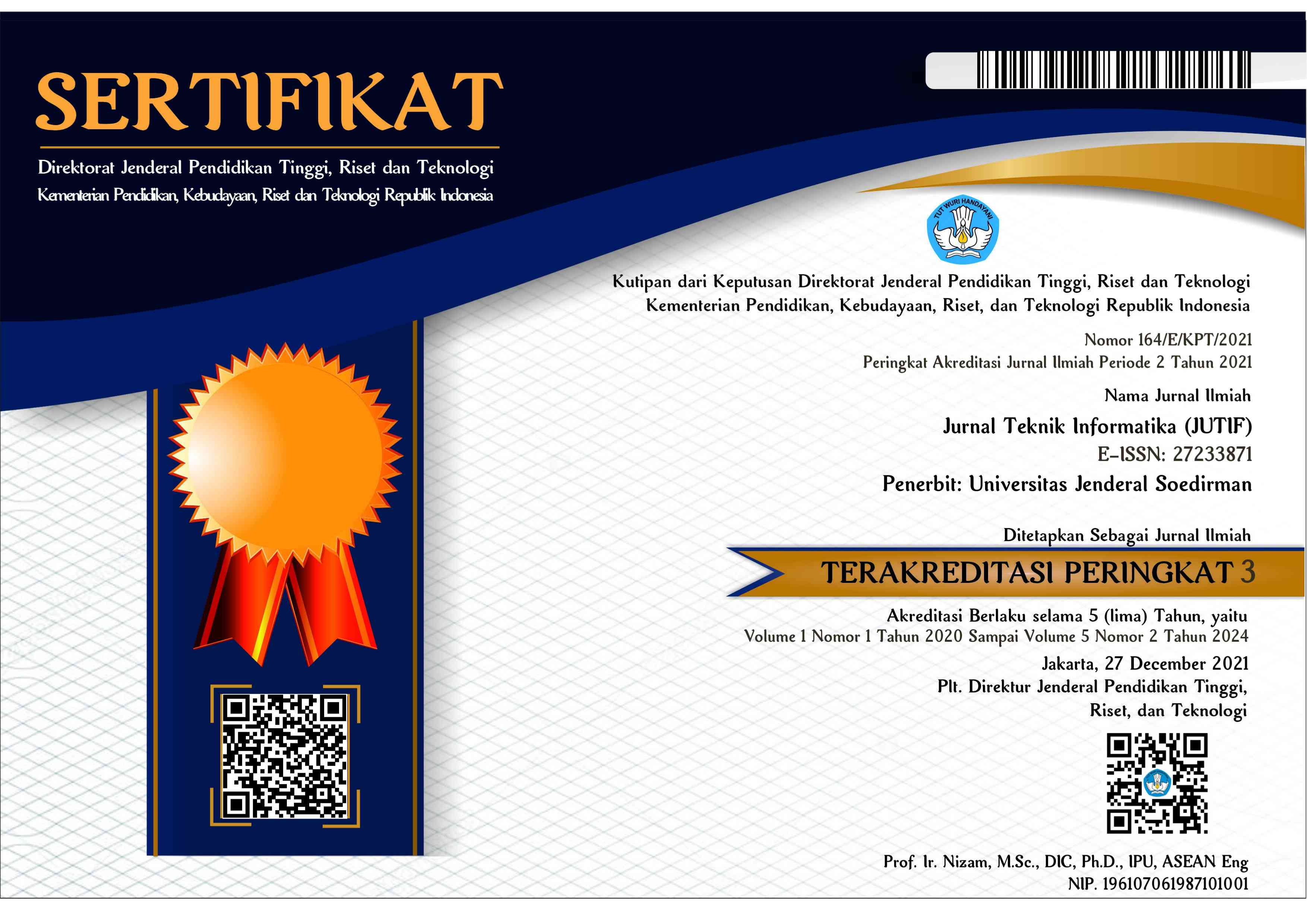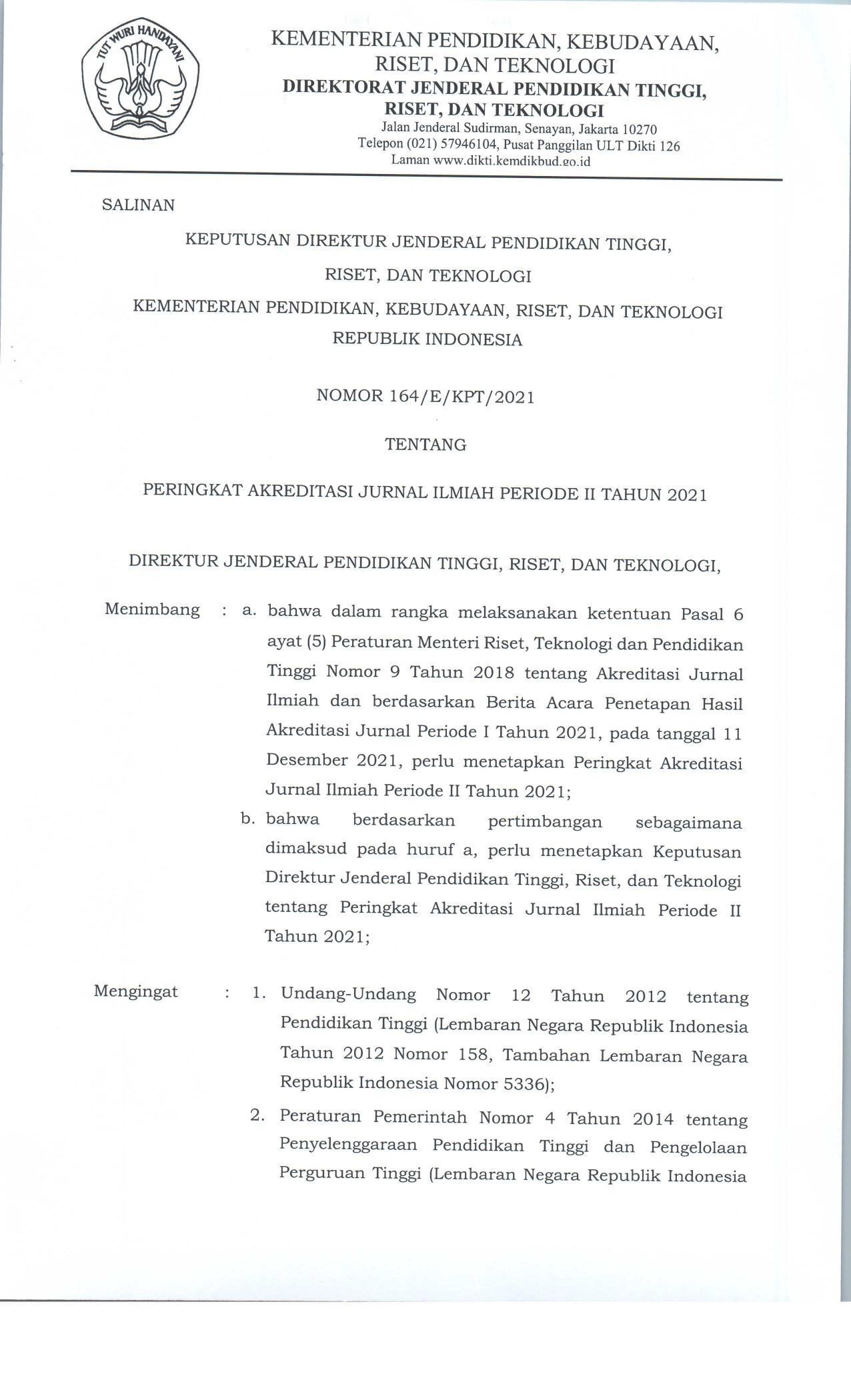BOARDING HOUSE RECOMMENDATION WITH COLLABORATIVE FILTERING USING THE GENERATIVE ADVERSARIAL NETWORKS (GANS) METHOD
Abstract
This research represents a concerted effort to tackle the pressing challenge of facilitating a personalized and efficient boarding house recommendation system tailored to individual user preferences, particularly among students. The overarching objective is to streamline and simplify the often arduous task of locating suitable accommodations by harnessing the potential of Collaborative Filtering. The deliberate selection of Collaborative Filtering as the cornerstone of this recommendation system stems from its proven efficacy in scrutinizing intricate user behavior patterns and deriving precise, tailored recommendations. Leveraging historical boarding house data, this methodology meticulously identifies patterns and similarities among users to offer suggestions finely aligned with their specific preferences. Integral to this research methodology is the concurrent utilization of Generative Adversarial Networks (GANs), serving a pivotal role in evaluating the system's accuracy. This dual-pronged approach, amalgamating Collaborative Filtering for recommendation generation and GANs for accuracy assessment, aims to ensure the system's efficacy in delivering precise, individualized suggestions. The findings of this study underscore a promising outcome – a system proficient in furnishing boarding house recommendations remarkably attuned to user preferences. This system's potential transcends the realm of student housing, presenting opportunities for broader applications across diverse fields requiring personalized recommendation systems. Crucially, the study's meticulous optimization of the GANs model, involving meticulous parameter adjustments including epoch count, optimizer selection (Adam), employment of mean absolute error (MAE) function, and fine-tuning a learning rate of 0.002, culminated in an outstanding achievement. The resultant MAE value of 0.0180 denotes minimal prediction errors, signifying estimations remarkably proximate to actual test data values, thus solidifying the system's reliability and precision. Ultimately, the successful development and evaluation of this boarding house recommendation system hold profound implications, promising to significantly enhance student experiences in discovering accommodations aligned with their preferences. Furthermore, this study's methodological approach paves the way for future research and wider applications in diverse domains seeking effective, personalized recommendation systems.
Downloads
References
J. Chen, X. Wang, S. Zhao, F. Qian, and Y. Zhang, “Deep attention user-based collaborative filtering for recommendation,” Neurocomputing, vol. 383, 2020, doi: 10.1016/j.neucom.2019.09.050.
H. Wang, “DotMat: Solving Cold-Start Problem and Alleviating Sparsity Problem for Recommender Systems,” 2022 IEEE 5th Int. Conf. Electron. Technol. ICET 2022, no. January, pp. 1323–1326, 2022, doi: 10.1109/ICET55676.2022.9824188.
D. Roy and M. Dutta, “A systematic review and research perspective on recommender systems,” J. Big Data, vol. 9, no. 1, 2022, doi: 10.1186/s40537-022-00592-5.
P. Khambatta, S. Mariadassou, J. Morris, and S. C. Wheeler, “Tailoring recommendation algorithms to ideal preferences makes users better off,” Sci. Rep., vol. 13, no. 1, pp. 1–9, 2023, doi: 10.1038/s41598-023-34192-x.
S. I. M. Ali and S. S. Majeed, “"A Review of collaborative filtering Recommendation System,” Muthanna J. Pure Sci., vol. 8, no. 1, pp. 120–131, 2021, doi: 10.52113/2/08.01.2021/120-131.
N. Mustafa, A. O. Ibrahim, A. Ahmed, and A. Abdullah, “Collaborative filtering: Techniques and applications,” Proc. - 2017 Int. Conf. Commun. Control. Comput. Electron. Eng. ICCCCEE 2017, no. May, 2017, doi: 10.1109/ICCCCEE.2017.7867668.
N. Yang, L. Chen, and Y. Yuan, “An improved collaborative filtering recommendation algorithm based on retroactive inhibition theory,” Appl. Sci., vol. 11, no. 2, pp. 1–20, 2021, doi: 10.3390/app11020843.
S. Li, “ Corrective Feedback in L2 Speech Production ,” TESOL Encycl. English Lang. Teach., no. March, pp. 1–9, 2018, doi: 10.1002/9781118784235.eelt0247.
W. Wang and Y. Lu, “Analysis of the Mean Absolute Error (MAE) and the Root Mean Square Error (RMSE) in Assessing Rounding Model,” IOP Conf. Ser. Mater. Sci. Eng., vol. 324, no. 1, 2018, doi: 10.1088/1757-899X/324/1/012049.
T. O. Hodson, “Root-mean-square error (RMSE) or mean absolute error (MAE): when to use them or not,” Geosci. Model Dev., vol. 15, no. 14, pp. 5481–5487, 2022, doi: 10.5194/gmd-15-5481-2022.
H. Ko, S. Lee, Y. Park, and A. Choi, “A Survey of Recommendation Systems: Recommendation Models, Techniques, and Application Fields,” Electron., vol. 11, no. 1, 2022, doi: 10.3390/electronics11010141.
J. M. Low, I. K. T. Tan, and C. Y. Ting, “Recent Developments in Recommender Systems,” Lect. Notes Comput. Sci. (including Subser. Lect. Notes Artif. Intell. Lect. Notes Bioinformatics), vol. 11909 LNAI, no. November, pp. 38–51, 2019, doi: 10.1007/978-3-030-33709-4_4.
M. Y. Chen, H. Sen Chiang, E. Lughofer, and E. Egrioglu, “Deep learning: emerging trends, applications and research challenges,” Soft Comput., vol. 24, no. 11, pp. 7835–7838, 2020, doi: 10.1007/s00500-020-04939-z.
A. Mohammed and R. Kora, “A comprehensive review on ensemble deep learning: Opportunities and challenges,” J. King Saud Univ. - Comput. Inf. Sci., vol. 35, no. 2, pp. 757–774, 2023, doi: 10.1016/j.jksuci.2023.01.014.
T. Carneiro, R. V. M. Da Nobrega, T. Nepomuceno, G. Bin Bian, V. H. C. De Albuquerque, and P. P. R. Filho, “Performance Analysis of Google Colaboratory as a Tool for Accelerating Deep Learning Applications,” IEEE Access, vol. 6, pp. 61677–61685, 2018, doi: 10.1109/ACCESS.2018.2874767.
R. Rustan, F. Dwi Ramadhan, M. F. Afrianto, L. Handayani, A. Puji Lestari, and F. Manin, “Perancangan Alat Pengukur Kadar Unsur Hara Npk Pupuk Kompos,” J. Online Phys., vol. 8, no. 1, pp. 55–60, 2022, doi: 10.22437/jop.v8i1.20838.
D. Pandove and A. Malhi, “A Correlation Based Recommendation System for Large Data Sets,” J. Grid Comput., vol. 19, no. 4, 2021, doi: 10.1007/s10723-021-09585-9.
S. Malik and M. Bansal, “Recommendation system: Techniques and issues,” Int. J. Recent Technol. Eng., vol. 8, no. 3, pp. 2821–2824, 2019, doi: 10.35940/ijrte.C5211.098319.
A. Abdalla, “Using Recommendation Systems to Recommend Relevant Items,” Fourth Int. Conf. Basic Sci. their Appl., no. December, 2020.
E. Angga, “User based collaborative filtering based on minkowski distance measure to support small medium enterprise ecommerce company,” J. Adv. Res. Dyn. Control Syst., vol. 11, no. 7 Special Issue, 2019.
H. Wang, “DotMat: Solving Cold-Start Problem and Alleviating Sparsity Problem for Recommender Systems,” 2022 IEEE 5th Int. Conf. Electron. Technol. ICET 2022, no. January, pp. 1323–1326, 2022, doi: 10.1109/ICET55676.2022.9824188.
Nasy`an Taufiq Al Ghifari, Benhard Sitohang, and Gusti Ayu Putri Saptawati, “Addressing Cold Start New User in Recommender System Based on Hybrid Approach: A review and bibliometric analysis,” IT J. Res. Dev., vol. 6, no. 1, pp. 1–16, 2021, doi: 10.25299/itjrd.2021.vol6(1).6118.
A. A. Fakhri, Z. K. A. Baizal, and E. B. Setiawan, “Restaurant Recommender System Using User-Based Collaborative Filtering Approach: A Case Study at Bandung Raya Region,” J. Phys. Conf. Ser., vol. 1192, no. 1, 2019, doi: 10.1088/1742-6596/1192/1/012023.
A. Shrestha, “Review of Deep Learning Algorithms and Architectures,” IEEE Access, vol. 7, pp. 53040–53065, 2019, doi: 10.1109/ACCESS.2019.2912200.
M. Lee, “Recent Advances in Generative Adversarial Networks for Gene Expression Data: A Comprehensive Review,” Mathematics, vol. 11, no. 14, 2023, doi: 10.3390/math11143055
A. Aggarwal, M. Mittal, and G. Battineni, “Generative adversarial network: An overview of theory and applications,” Int. J. Inf. Manag. Data Insights, vol. 1, no. 1, 2021, doi: 10.1016/j.jjimei.2020.100004.
M. Gao, J. Zhang, J. Yu, J. Li, J. Wen, and Q. Xiong, “Recommender systems based on generative adversarial networks: A problem-driven perspective,” Inf. Sci. (Ny)., vol. 546, pp. 1166–1185, 2021, doi: 10.1016/j.ins.2020.09.013.
Copyright (c) 2024 Mohammad Fajra Septariken, Donni Richasdy , Ramanti Dharayani

This work is licensed under a Creative Commons Attribution 4.0 International License.





























